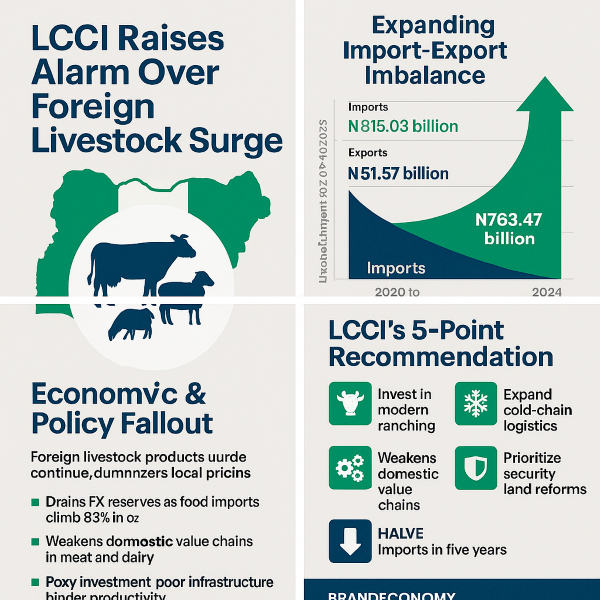LCCI Raises Alarm Over Foreign Livestock Surge, Warns of Looming Threat to Nigeria’s Agribusiness Economy

Nigeria’s livestock sector — a critical component of the country’s food and economic security — is facing mounting pressure from a wave of cheap, imported animal products that threaten to undercut local farmers and destabilize the nation’s rural economy.
The Lagos Chamber of Commerce and Industry (LCCI) has sounded the alarm, warning that the unchecked influx of cheaper foreign livestock products is eroding domestic competitiveness, depleting foreign reserves, and discouraging investment in Nigeria’s agro-value chain.
Speaking at a media briefing in Lagos, Mr. Gabriel Idahosa, President of the LCCI, decried the growing dependence on imported livestock products, which he said was “forcing many small agribusinesses to shut down, while weakening the foundations of Nigeria’s agricultural self-sufficiency.”
Foreign Flood, Local Fallout
According to the National Bureau of Statistics (NBS), Nigeria imported ₦815.03 billion worth of livestock and related products in the first half of 2025, while exports stood at only ₦51.57 billion, creating a staggering ₦763.47 billion trade deficit.
Between 2020 and mid-2025, total livestock imports skyrocketed from ₦454.52 billion in 2020 to ₦1.49 trillion in 2024, bringing the cumulative five-year import bill to ₦4.46 trillion.
These figures, Idahosa stressed, paint a worrying picture: Nigeria’s livestock and dairy sector has become dangerously reliant on external supply to meet domestic consumption and industrial demand.
Currency Disparities and the Price Trap
The LCCI attributed the unrelenting import surge to global price disparities. “Imported products are often priced lower due to stronger foreign currencies, advanced technology, and lower production costs abroad,” Idahosa explained.
This pricing imbalance gives foreign producers an edge in the Nigerian market, squeezing local producers who face higher costs due to poor infrastructure, insecurity, and volatile input prices.
The economic consequence, he warned, is twofold:
- A drain on Nigeria’s foreign exchange reserves, which are already under severe strain from food and energy imports.
- A weakening of domestic value chains, especially in dairy, poultry, and meat processing — sectors that should be driving job creation and rural prosperity.
In Q2 2025 alone, Nigeria’s food import bill reached ₦1.18 trillion, representing a 33% year-on-year increase — a trend LCCI describes as “unsustainable for a nation with vast agricultural potential.”
Nigeria’s Dairy Dilemma: Low Yields, High Imports
Nowhere is this dependence more glaring than in the dairy sub-sector. Nigeria currently produces only about 600,000 metric tonnes of milk annually, against a national demand of over one million tonnes.
Average milk yield from local cows hovers around 1.5 litres per day, compared to over 20 litres daily in countries with advanced ranching systems.
This productivity gap has turned Nigeria into one of Africa’s largest dairy importers, spending an estimated $1.5 billion annually on milk and dairy derivatives — from powdered milk and cheese to yogurt and infant formula.
Systemic Challenges: Weak Infrastructure, Policy Instability, and Insecurity
While Nigeria possesses the technical expertise and human capacity to scale livestock production, the LCCI says these advantages are undermined by structural bottlenecks:
- Poor investment climate discouraging large-scale ranching and processing.
- Weak rural infrastructure — roads, power, and water systems — that inflate logistics costs.
- Insecurity across pastoral regions, disrupting grazing routes and livestock trade.
- Policy inconsistency, especially around import tariffs, subsidies, and land-use reforms.
These factors, Idahosa said, “combine to make local production uncompetitive while incentivizing imports — a cycle that perpetuates dependency and economic vulnerability.”
Policy Roadmap: From Import Comfort to Export Confidence
The LCCI has called for an urgent national livestock transformation agenda that prioritizes productivity, sustainability, and market access.
According to Idahosa, Nigeria must move beyond import substitution rhetoric and adopt measurable, time-bound targets that drive tangible outcomes.
Key Recommendations:
- Invest in Modern Ranching Systems – Encourage large-scale, private-sector-led ranches supported by smart irrigation, feed formulation, and breeding technologies.
- Expand Cold-Chain Logistics – Develop a nationwide network for cold storage, transportation, and processing to reduce post-harvest losses.
- Strengthen Policy and Fiscal Incentives – Implement predictable tariffs and credit schemes to support domestic livestock investors.
- Prioritize Security and Land Reforms – Secure grazing corridors and incentivize the transition from open grazing to enclosed, managed systems.
- Halve Livestock Imports in Five Years – Set clear performance indicators for ministries and agencies under the Federal Ministry of Livestock Development.
“The goal,” Idahosa emphasized, “should not be import comfort but export confidence. Nigeria should be exporting livestock, dairy, and leather derivatives across West Africa — not financing jobs and prosperity abroad.”
BRANDECONOMY INSIGHT: A Sector on the Cusp of Transformation
Nigeria’s livestock industry contributes an estimated 8–10% of agricultural GDP, employing millions across rural and peri-urban communities. Yet, it remains one of the least modernized segments of the country’s food economy.
With over 20 million cattle, 40 million goats, and 25 million sheep, Nigeria ranks among Africa’s top livestock producers by headcount. However, its productivity remains among the lowest globally due to outdated methods and poor value-chain integration.
Analysts say that targeted investments in breeding technology, animal health, and market infrastructure could unlock a $15 billion agribusiness opportunity within a decade.
As the global livestock market pivots toward sustainability, traceability, and efficiency, Nigeria’s ability to localize production and attract agritech investments will determine its competitiveness in the coming years.
Conclusion: From Vulnerability to Vitality
The warning from the Lagos Chamber of Commerce and Industry is both timely and urgent.
Nigeria stands at a crossroads: either continue to rely on cheaper imports that erode domestic value creation or embark on a bold path to revive its livestock economy as a pillar of national resilience and export diversification.
For policymakers, the message is clear — protecting local producers is not protectionism; it is economic prudence.
A reformed, well-financed livestock ecosystem can become the backbone of food security, industrial input supply, and inclusive rural prosperity.











